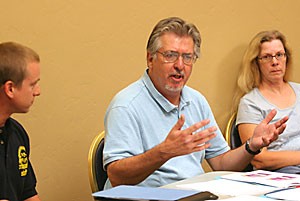Mike Tully thinks it’s disturbing that students abandon their animals at the ends of semesters.
Tully, a media specialist and College of Education staff member, went before the Graduate and Professional Student Council last night to speak on behalf of the Pet Rescue Project, an animal welfare group hoping to curtail such abandonment.
“”We perceive a problem which is arising from the student population, that should be resolved by the student population,”” he said.
Tully was joined by employees from the Tucson Humane Society, the Pima Animal Control Center (PACC) and the Animal Welfare Alliance of Southern Arizona.
Data compiled by the PACC show a marked increase in incidences of stray animals in May and June – corresponding to the end of the spring semester.
“”A lot of students go back home to some other city they come from and they leave the dog or cat behind,”” Tully said. “”There’s a direct connection between that abandonment by university students and the increase in animals we see at the (Pima) Animal Care Center.””
In May 2006, PACC took in 282 stray animals, according to PACC data. That number spiked to 897 the following month.
The totals reflect the number of stray animals citywide, so it’s unclear how many of those stray animals students abandoned, Tully said.
Pet abandonment is a national problem every city with a sizable college community faces, he added.
Tully sought the help of the UA graduate student community after the elected representatives of the undergraduate student body failed to reply to his e-mails, he said.
He proposed the construction of a student-run Web site that would enable individuals to report lost and found pets.
In addition to information on pet ownership, Tully suggested a “”fostering program”” that would provide an alternative for students considering abandoning their pet.
“”I’m certain that many students who leave their dogs behind at the beginning of summer would love to have those dogs taken care of for two or three months by a foster family here in town,”” he said.
GPSC representatives welcomed the proposition in principle but expressed concern about securing money to fund the program.
“”That’s always an issue here at the university – who’s going to pay for it,”” said GPSC president Catherine Neish, an optical sciences doctoral student.
Tully said he was confident funding for such a program could be found “”right here on this campus.”” He suggested that the program be incorporated into an accredited class.
“”I don’t think the Humane Society should (fund) it,”” Tully said. “”I don’t think anybody off campus should do it, because it’s a student problem, and we want a student solution – with some money from the university.””









